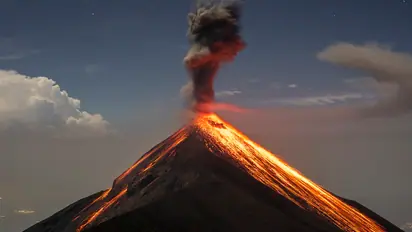Scientists warn of 1-in-6 chance of massive volcanic eruption this century, says humanity is 'NOT' prepared

Synopsis
Scientists warn of a potential massive volcanic eruption this century, which could trigger global cooling, crop failures, and widespread disruption, exacerbated by climate change.
A new study has raised alarms about the growing likelihood of a massive volcanic eruption occurring within this century, with experts warning of a "one-in-six" chance of such an event. If it occurs, the eruption could unleash global climate chaos, resembling the devastating 1815 eruption of Indonesia’s Mount Tambora, which released 24 cubic miles of gases, dust, and rock into the atmosphere, causing a global temperature drop and triggering widespread famine and disease.
Dr. Markus Stoffel, a climate professor at the University of Geneva, emphasized the severity of this risk, stating, "Humanity has no plan to address it." The 1815 eruption of Mount Tambora released a vast amount of gases, dust, and rock into the atmosphere, which caused the "Year Without a Summer." Global temperatures dropped, leading to crop failures, food shortages, and disease, resulting in tens of thousands of deaths.
Today, however, the planet’s reliance on fossil fuels and the rising levels of greenhouse gases could exacerbate the effects of a volcanic eruption. Dr. Michael Rampino, a geological scientist, noted that the world is more unstable now than it was in 1815, which could make the aftermath of a massive eruption even more severe.
Recent research by volcanologist Dr. Thomas Aubry indicates that a hotter atmosphere, already affected by climate change, could amplify the cooling effects of volcanic eruptions. The increased turbulence in the atmosphere would cause sulfur dioxide—a key compound released during volcanic eruptions—to spread more rapidly. This would enhance the formation of sulfate aerosols, tiny particles that reflect sunlight and can cool the planet.
Dr. Anja Schmidt, an atmospheric scientist from Cambridge, explained that these aerosols are most effective when they are in a specific size range, which would allow them to scatter sunlight efficiently. According to research co-authored by Dr. Schmidt and Dr. Aubry, a future eruption in a warmer world could lead to a 15% greater cooling effect due to the increased efficiency of these aerosols.
Despite these insights, scientists still face significant uncertainties. Dr. Stoffel cautioned that current volcanic eruption models are based on limited data, particularly when it comes to older volcanoes. To address these gaps, researchers rely on ice cores and tree rings to study past eruptions. These sources have shown that large volcanic events have temporarily cooled the Earth by up to 1.5°C, with the 1815 Tambora eruption leading to a 1°C drop in global temperatures.
While more recent eruptions, such as the 1991 eruption of Mount Pinatubo, have been better studied using satellite data, predicting the next major eruption remains a significant challenge. Dr. Stoffel said, "Which one next and when—that’s still impossible to predict."
With the potential for climate chaos on the horizon, experts stress the need for better preparedness. Dr. Aubry noted that the behavior of volcanoes could be influenced by climate change itself, as melting glaciers can reduce pressure on magma reservoirs, potentially triggering eruptions. Additionally, increased rainfall, driven by climate change, could lead to "steam bomb"-like explosions, raising the likelihood of eruptions in areas like Iceland and Indonesia.
A 2022 study found that around 716 volcanoes, or 58% of known active volcanoes, could be affected by these climate change-related factors, significantly raising the chances of eruptions in the coming decades. Dr. Aubry warned that this means the world could see more frequent eruptions in the future.
Given the interconnected nature of today's world, the effects of a large volcanic eruption could be far-reaching. Dr. Stoffel emphasized the importance of planning for the worst-case scenario, including developing evacuation strategies and preparing food aid for potential crop failures. A volcanic eruption in the 21st century could have devastating consequences on a more populated and globalized world, making the need for proactive planning more urgent than ever.
Check the Breaking News Today and Latest News from across India and around the world. Stay updated with the latest World News and global developments from politics to economy and current affairs. Get in-depth coverage of China News, Europe News, Pakistan News, and South Asia News, along with top headlines from the UK and US. Follow expert analysis, international trends, and breaking updates from around the globe. Download the Asianet News Official App from the Android Play Store and iPhone App Store for accurate and timely news updates anytime, anywhere.